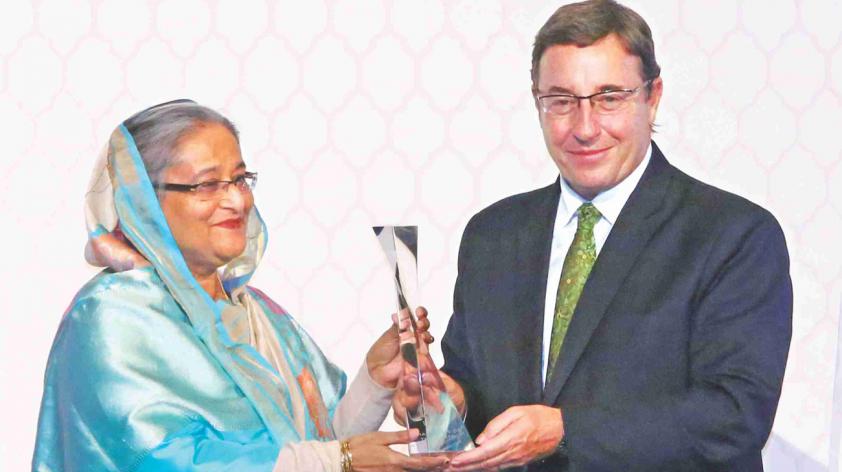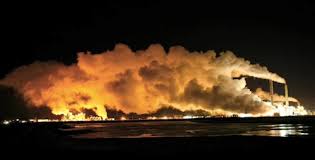It is perplexing that United Nations awarded the Champions of the earth award in the Policy Leadership category at a ceremony on 27 September 2015 at New York. The annual Champions of the Earth award is the highest environmental accolade that the United Nations can confer upon outstanding individuals and organizations.
Prime Minister Sheikh Hasina receives “Champions of the Earth” award, UN’s highest environmental honor, from United Nations Environment Program Executive Director Achim Steiner at a program in New York on Sunday.
Bangladesh has reached an agreement with India to construct a 1320 Megawatt coal burning power plant just 14 km north, more precisely just 9km away from many reserved sections of the World’s largest mangrove forest. This massive freight will need about 59 ships each having an 80,000 ton capacity that take to the port which is 40 Kilometers away from the plant and its route cuts through the Sundarbans.
Sundarbans is the world’s largest mangrove forest and a UNESCO world’s heritage site. This proposed power plant is going to be built within 14 km of the forest, more precisely just 9km away from many reserved sections of the forest. This will definitely have a devastating and irreversible impact on the Sundarbans, its ecology and biodiversity.
For establishing this 1320 Megawatt power plant, Bangladesh will need to import about 4.72 million tons of coal each year. This massive freight will need about 59 ships each having an 80,000 ton capacity to carry to the port which is 40 Kilometers away from the plant and its route cuts through the Sundarbans.
The scale of impact is beyond doubt and that has stirred the local dwellers and environmental activists to stop this dangerous project. Many esteemed organizations, political parties and national leaders have spoken against the Rampal plant. The message has been simple – “There are many alternatives to generate power, but Sundarbans has no alternative”.
A coal burning plant would cause tremendous pollution in the most environmentally sensitive region of Bangladesh
Three French banks say they will not invest in Rampal power plant in Bangladesh. As the plant struggles for funding, a report says it is non-compliant with minimum environmental and social standards. Six months earlier two Norwegian pension funds pulled out their investments from India’s National Thermal Power Corporation that is building the project.
During his visit to Bangladesh on 6 June 2015, Indian Prime Minister Narendra Modi endorsed the 1,320 MW Rampal coal- based thermal power project. He said, The Rampal power project is making progress in accordance with your laws and regulation. We can do more together in power sector, here and in India.
Under an agreement signed in 2012, India’s largest coal power company, the state-owned National Thermal Power Corporation (NTPC) would develop the plant in Khulna division as a joint venture with Bangladesh’s Power Development Board.
Activists are concerned the plant, less than 10 miles from the protected Sundarbans mangrove forest, would lead to its environmental degradation from increased ship traffic, dredging, and pollution of air and water.
Coal-fired thermal power plants belch toxic gases that could impact wildlife and human health, and forest quality in the neighborhood.
Before Modi arrived in Dhaka, activists urged the leaders of the two countries to stop the plant. On 21 May, the National Committee to Protect Oil, Gas, Mineral Resources, Power and Ports held a rally in front of the National Press Club. If the project wasn’t stopped, the secretary of the organization said it would escalate the movement.
On 5 June, other organizations such as National Committee for Saving the Sundarbans, Bangladesh Poribesh Andolan, Bangladesh Environmental Lawyers Association, and Poribesh Bachao Andolan renewed their call to scrap the plant.
Their fears are not unfounded. India’s first environmental rating of coal-fired thermal plants was published by the Green Rating Project of the Centre for Science and Environment, Delhi. Since NTPC refused to collaborate, the rating was based on primary data and publicly available information. In India, the company operates 25 thermal plants and a further nine under joint venture collaborations. Six of these plants scored poorly on environmental parameters, rating a mere 16 to 28% compared to the best possible rating of 80%.
Bank Track, a coalition of organizations tracking the financial sector, released its analysis of the Rampal plant under the Equator Principles, an environmental and social risk management framework for financial institutions. In its executive summary, the reports says,
“The analysis shows that serious deficiencies in project design, planning, and implementation and due diligence obligations render the project non-compliant with the minimum social and environmental standards established by the Equator Principles, as well as the International Finance Corporation’s Performance Standards.”
This failure to achieve even minimum standards could make any financial institution nervous of funding the project.
Loans are expected to fund up to 70% of the $1.5b project, while India and Bangladesh will fund the remaining 30% equally. However, the Bangladesh Planning Commission refused approval. It said the project was not compliant with the country’s existing policy nor was the funding and ownership of the plant clear. This leaves even the 15% Bangladesh stake in the project uncertain.
Bangladesh Chronicle












You cannot expect anything positive from this government of Hasina. To remain in power, she will sell Bangladesh to India.
You may like to listen to this https://www.youtube.com/watch?v=BFjTJwy7zoY
Thanks Mortuza Huq – every word that was said in the clip that you have posted is correct. The Earth prize given to Hasina by UNEP is a cse of serious mis-judgement and will go down as another blot in the current dwindling image of UN.